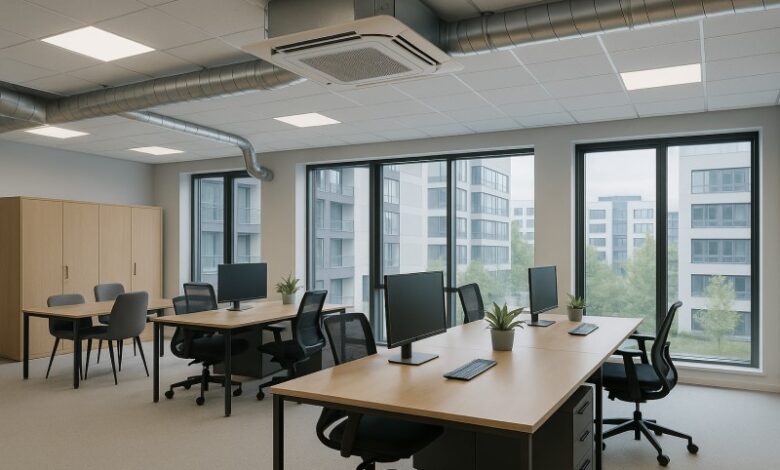Create the Perfect Office Environment: The Role of Modern HVAC Systems

Modern HVAC systems play a crucial role in maintaining efficient, adaptable and future-ready workplaces. Not only do they keep office workers cool and comfortable, they can shape the entire workplace environment. Find out how by reading on.
The Impact of Office Climate on Productivity and Wellbeing
The temperature and air quality in a workplace can significantly influence how people feel and perform. When employees are too hot, too cold or breathing stale air, their concentration and comfort levels drop. Over time, this leads to lower output, increased sick days and poor morale.
Older systems often fail to meet the demands of modern working environments. Uneven heating, poor ventilation and excess noise are all common complaints. These issues are particularly noticeable in shared spaces or open-plan layouts where a single temperature setting rarely works for everyone. A well-planned office HVAC installation can address these challenges with precision and control.
Employers are increasingly expected to provide working conditions that support health and wellbeing. A consistent, clean and comfortable indoor climate can boost employee satisfaction, reduce absenteeism and support long-term retention.
What Makes HVAC Systems ‘Modern’?
Modern HVAC systems are defined by their smart technology, energy-efficient design and responsive performance. Unlike older systems, they are equipped with advanced sensors and controls that adapt to real-time usage, external weather conditions and indoor occupancy levels.
Many now feature technologies like variable refrigerant flow (VRF), demand-controlled ventilation and intelligent zoning. These innovations ensure that the right amount of cooling or heating is delivered where and when it’s needed. Internet connectivity is also increasingly common, enabling facility managers to monitor performance remotely and make adjustments through integrated dashboards.
The benefit of all this technology is a more reliable and efficient indoor environment. HVAC in offices can now deliver optimal comfort with minimal energy waste. It’s also easier to troubleshoot issues before they escalate, thanks to predictive diagnostics built into many newer systems.
Customising HVAC Systems for Office Spaces
A tailored approach is essential when designing an HVAC system for an office. Layout, usage patterns and building type all affect the demands placed on heating and cooling equipment. Open-plan areas, private offices, meeting rooms and server spaces each require different solutions to maintain comfort and performance.
Zoning is particularly important in larger or multi-use spaces. Sensors can detect occupancy and automatically adjust settings to suit the number of people in a room. This helps to reduce energy consumption and ensures that temperature levels remain consistent throughout the day without manual intervention.
In older buildings or period properties, retrofitting can be challenging. However, modern systems offer greater flexibility. Compact, ductless units and ceiling-mounted cassettes allow for efficient upgrades without major structural work. These systems can preserve a building’s character while significantly improving environmental control.
Energy Efficiency and Sustainability
Sustainability is high on the agenda for many organisations and HVAC systems have a major role to play in this regard. Features such as heat recovery ventilation, inverter-driven compressors and programmable thermostats can drastically cut energy use. Some systems even adjust automatically based on outside temperature or time of day, optimising performance without the need for constant input.
For businesses aiming to achieve BREEAM or WELL certification, HVAC is a key consideration. Investing in sustainable office-based HVAC systems also enhances a company’s environmental credentials.
Maintenance and Long-Term Performance
Like any building system, HVAC equipment requires regular upkeep to remain effective and compliant. Without proper maintenance, performance will deteriorate over time, leading to higher energy usage and potential safety risks. In the UK, businesses must also comply with F-Gas regulations and carry out TM44 inspections where applicable.
Modern systems make maintenance easier through integrated diagnostics and real-time performance alerts. Predictive maintenance can flag issues before they develop into serious faults, reducing downtime and avoiding emergency callouts. This is especially valuable in busy office environments where comfort must be maintained without disruption.
A well-maintained HVAC system improves air quality, ensures consistent temperatures and extends equipment lifespan. Investing in scheduled servicing not only protects the initial outlay but also supports staff comfort, compliance and energy efficiency throughout the year.
Conclusion
Modern HVAC systems are central to creating a productive, comfortable and energy-conscious office. They support staff wellbeing, lower running costs and help organisations meet both legal and environmental obligations. Whether you’re upgrading an outdated setup or planning for a new fit-out, a smart, tailored HVAC solution can transform your workplace for the better.


